湘少版Unit4.Where were you Mingming
2020年湘少版五年级上学期英语Unit 4 Can I use your pencil, please?单元检测卷(含答案)

Unit 4 Can I use your pencil, please?单元测试卷听力部分一、听录音,选出你所听到的内容。
( ) 1. A. kite B. glue C. marker ( ) 2. A. tomorrow B. today C. yesterday ( ) 3. A. blackboard B. window C. floor ( ) 4. A. brush B. pencil C. glue ( ) 5. A. excuse me B. put on C. draw a line 二、听录音,判断所听内容与下列句子是(√)否(×)一致。
( ) 1. Excuse me, can I borrow a ruler?( ) 2. They are in my schoolbag.( ) 3. It’s a nice kite.( ) 4. Please clean the blackboard.( ) 5. You can use my glue.三、听录音,选择正确的答语。
( ) 1. A. They are in my desk. B. They are my books.( ) 2. A. Yes. Here you are. B. No, here it is.( ) 3. A. I go to school. B. I want a pencil.( ) 4. A. I’m drawing. B. I’m hungry.( ) 5. A. You’re welcome. B. Thank you!四、听录音,补全对话。
---Excuse (1) .--- (2) ?---Can I (3) your (4) ?---Yes. Here you (5) .---Thank you.笔试部分一、根据汉语提示补全单词。
1. 借b_rr_ _2. 英语_ngl_sh3. 打扫cl_ _n4. 东西th_ _ _5. 橡皮擦er_s_ _二、选择最佳答案。
(湘少版)三年级英语下册课件 Unit 4

Look at the T-shirts.
看这件T恤
新词抢先
look but big 看 at 在;向 they 他(她;它)们 但是 too 太 大的 nice 好的 and 和
新词抢先
T-shirt
T恤
trousers
长裤
dress
连衣裙
shorts
短裤
coat
外套
shirt
衬衫
看这件T恤。 它们好漂亮。 是的.我喜欢 这件红色的.
我喜欢这件绿色的. 但是它太大了.
看这件蓝色的短裤.
哦,它们好好看。
连衣裙 长裤
T恤
短裤
大衣
衬衫
Unit 4
Look at the T-shirts.
看这件T恤
龙形市中心学校
尹良斌
连衣裙 长裤
T恤
短裤
大衣
衬衫
这是你的连衣裙吗,海伦?
看看我的新T恤
它好好看啊!
不.我的连衣裙是蓝白色的。
这是你的大衣吗,蒂姆?
是是。 它太大了。
家庭作业
完成基础训练18页20页
Thank you
湘少版四年级英语 复习资料

湘少版四年级英语复习资料meet遇到1.---How are you?(你好吗?)---I’m fine.Thank you.(我很好,谢谢。
)2.---Nice to meet you.(见到你很高兴。
)---Nice to meet you, too.(见到你也很高兴。
)3.---Glad to see you.(见到你很高兴。
)---Glad to see you, too.(见到你也很高兴。
)4.Good morning. (早上好。
)5.Good afternoon.(下午好。
)6.---What’s your name?(你叫什么名字?)---My name is ... .(我的名字叫。
)7.This is Chen Dong. He’s my brother. (这是陈东,他是我的弟弟。
)Unit 2:1.circle圆square正方形line线,直线dot点flag旗triangle三角形rectangle矩形,长方形2.---What’s this? (这是什么?)---It’s a circle.(它是一个圆。
)3.---What’s that? (那是什么?)---It’s a square.(它是一个正方形。
)4.---How many circles are there?(这有多少个圆?)---Seven.或:There are seven circles.(有7个圆。
)5.---What are you doing?(你在做什么?)---I’m drawing.(我在画画。
)Unit 3:1.a strong tiger(一只强壮的老虎)a beautiful bird (一只漂亮的小鸟)a big elephant(一只大的大象)a funny monkey(一只有趣的猴子)a small mouse(一只小的老鼠)2.look at看zoo动物园lazy懒惰的animal动物3.Look at that elephant. It’s big.(看那只大象。
湘少版小学英语知识点汇总

湘少版小学英语知识点汇总研究必备,欢迎下载湘少版小学英语知识点汇总,三年级上册。
一、问候1.问候语:Hello。
/ Hi。
我是……2.问名字:What’s your name。
回答可以是I’m…/ My name is…3.见面礼:Nice to meet you。
对方回答可以是Nice to meet you too!4.时间问候:XXX.5.告别:XXX。
/ XXX-bye!二、询问身份1.直接问:Who are you。
回答可以是I’m…2.间接问:Who is he/she。
回答可以是He/She is… / Who are they。
回答可以是They are…三、选择疑问句(是不是?)1.直接问:Are you…。
回答可以是Yes。
I am。
/ No。
I’m not.2.间接问:Is he/she…。
回答可以是Yes。
he/she is。
/ No。
he/she isn’t。
/ Are they…。
回答可以是Yes。
they are。
/ No。
they aren’t.四、介绍1.介绍家庭成员:This is my family。
询问可以是Is this your family。
回答可以是Yes。
it is。
/ No。
it isn’t.五、问身份1.直接问:XXX。
回答可以是XXX.What are they。
They are pupils。
XXX.Is he/she a soldier。
Yes。
he/she is。
/ No。
he/she isn't.Are they pupils。
Yes。
they are。
/ No。
they aren't.XXX。
It's a。
What are these/those。
These/Those are。
Personal pronouns: I。
you。
he/she/it。
we。
you。
they.Be verbs: is (singular)。
2020年【湘少版】(三起)五年级英语下册-【Unit 1-12】单元知识梳理
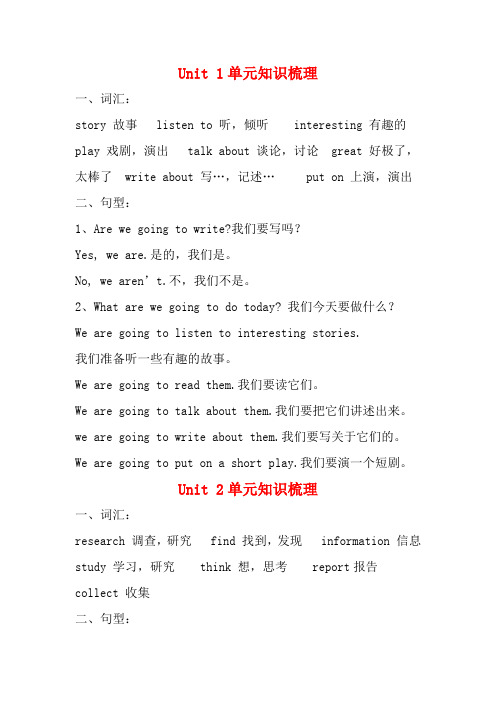
Unit 1单元知识梳理一、词汇:story 故事 listen to 听,倾听 interesting 有趣的play 戏剧,演出 talk about 谈论,讨论 great 好极了,太棒了 write about 写…,记述… put on 上演,演出二、句型:1、Are we going to write?我们要写吗?Yes, we are.是的,我们是。
No, we aren’t.不,我们不是。
2、What are we going to do today? 我们今天要做什么?We are going to listen to interesting stories.我们准备听一些有趣的故事。
We are going to read them.我们要读它们。
We are going to talk about them.我们要把它们讲述出来。
we are going to write about them.我们要写关于它们的。
We are going to put on a short play.我们要演一个短剧。
Unit 2单元知识梳理一、词汇:research 调查,研究 find 找到,发现 information 信息study 学习,研究 think 想,思考 report报告collect 收集二、句型:What are we going to do?我们要做什么?We are going to do some research.我们要做一些调查。
We are going to read and find information.我们要阅读,找出信息。
We are going to collect pictures.我们要收集图片We are going to study and think.我们要研究和思考。
We are going to write a report.我们要写成报告。
湘少版五年级英语下册Unit Where were you,Mingming
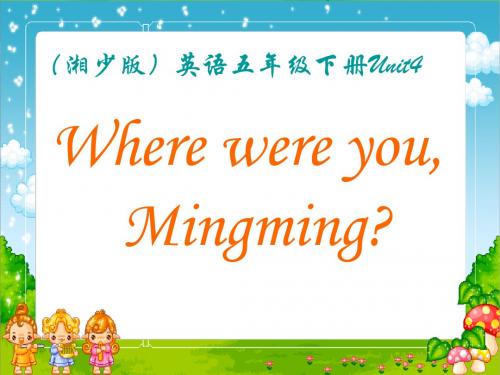
• yesterday, today, weekend, weekdays, sick, railway station
• hand in, cousin, vally, crystal cave, take pictures, sight, waterfall
Today
Yesterday
5月7日
周六
weekend = weekdays
5 月 7 日 周六
sick
railway station
cousin
vally
sight
crystal cave
waterfall
take pictures
hand in
Where were you, Mingming? I was in bed at home.
(湘少版)英语五年级下册Unitage structure:
• Where were you, Mingming? • I was in bed at home. • We went to the Changsha Railway
Station to meet him.
水不试,不知哪深哪浅,人不交,不知谁好谁坏!
最近很流行的一段话: “如果我用
你待我的方式来待你,恐怕你早已 离去!” 这句话,适合任何关系 ! 凡事换个角度,假如你是我,未必 能有我大度。
男人是条狼, 选对了保护你, 选错了折磨你!
女人是条蛇,选对了缠着你, 选错了毒死你!
朋友是条路, 选对了帮着你, 选错了绕死你!
We went to the Changsha Railway Station to meet him.
“一别两宽,各生欢喜”出自敦煌山洞出土的唐朝人“放妻协议”,这份离 婚协议书的主要内容是:“凡为夫妇之因,前世三生结缘,始配今生为夫 妇。若结缘不合,比是冤家,故来相对;即以二心不同,难归一意,快会 及诸亲,各还本道。愿妻娘子相离之后,”一别两宽,各生欢喜“,意思就 是:我们好聚好散吧
湘少版英语四级下册知识点
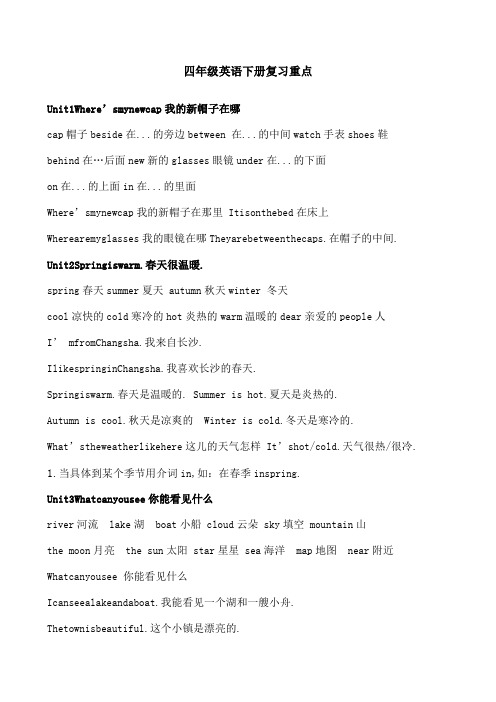
四年级英语下册复习重点Unit1Where’smynewcap我的新帽子在哪cap帽子beside在...的旁边between 在...的中间watch手表shoes鞋behind在…后面new新的glasses眼镜under在...的下面on在...的上面in在...的里面Where’smynewcap我的新帽子在那里 Itisonthebed在床上Wherearemyglasses我的眼镜在哪Theyarebetweenthecaps.在帽子的中间. Unit2Springiswarm.春天很温暖.spring春天summer夏天 autumn秋天winter 冬天cool凉快的cold寒冷的hot炎热的warm温暖的dear亲爱的people人I’ mfromChangsha.我来自长沙.IlikespringinChangsha.我喜欢长沙的春天.Springiswarm.春天是温暖的. Summer is hot.夏天是炎热的.Autumn is cool.秋天是凉爽的 Winter is cold.冬天是寒冷的.What’stheweatherlikehere这儿的天气怎样It’shot/cold.天气很热/很冷.1.当具体到某个季节用介词in,如:在春季inspring.Unit3Whatcanyousee你能看见什么river河流 lake湖 boat小船 cloud云朵 sky填空 mountain山the moon月亮 the sun太阳 star星星 sea海洋 map地图 near附近Whatcanyousee 你能看见什么Icanseealakeandaboat.我能看见一个湖和一艘小舟.Thetownisbeautiful.这个小镇是漂亮的.1.sun,moon是专有名词,前面要加the.表示太阳,月亮时,为thesun,themoonUnit4CanyouwriteinEnglish你能用英语写字吗write 写 read读 draw画 paint涂色 dance跳舞 sing唱inEnglish用英语busy忙碌can能够climb爬,攀登writea letter写一封信CanyouwriteinEnglish 你能用英语写吗 Yes,Ican.是的,我能No,Ican’ t.不,我不能.I’msorry.I’mbusynow.对不起,我现在很忙.Sure当然可以.Canyouclimbatree你会爬树吗No,Ican’t.Unit5Peteriswriting.彼得正在写字.Unit6What’s Anne doing安正在做什么单词:cook cooking 炒菜 eat eating 吃 drink drinking 喝 play playing 玩watch watching 观看 sleep sleeping 睡觉 skip skipping跳绳runrunning跑swimswimming游泳football足球 table tennis乒乓球 basketball 篮球 playground操场What’sAnnedoing 安妮正在干什么She’sskipping. 她正在跳绳. Whataretheydoing 他们正在干什么Theyareplayingbasketball. 他们正在打篮球.She’sclimbing她正在爬山.Sheishopping.她正在单足跳.规律:skip-skipping跳绳run-running跑步swim-swimming游泳单词以一个元音字母a,e,i,o,u+一个辅音字母除5个元音以外的21个字母结尾的,要双写辅音即末尾字母字母+ing.Unit7TodayisSaturday.今天星期六.过关单词:today今天 Sunday星期天 Monday星期一 Tuesday星期二 Wednesday星期三 Thursday星期四 Friday星期五 Saturday星期六music音乐class课程tomorrow 明天Whatdayisittoday今天星期几 TodayisWednesday.今天星期三.It’sMonday. 今天是星期一.用星期描述日常活动:具体到某天用介词on,如:在星期天onSunday.我在星期一打篮球.IplaybasketballonMonday.Unit8IcomefromChina.我来自中国.过关单词:comefrom来自country国家 China中国Canada加拿大France法国theUK 英国theUSA/America美国Australia澳大利亚过关句型: Whereareyoufrom你来自哪里I’mfro mChina/Canada/America.我来自中国/加拿大/美国WheredoyoucomefromIcomefromAustralia/China./Canada.我来自澳大利亚/中国/加拿大Unit9Howmuchisit多少钱.过关单词:howmuch多少钱dollar美圆pound英镑yuan元help帮忙want想要knife 小刀crayon蜡笔brush刷子ball球toycar玩具车过关句型: Howmuchisit这个要多少钱It’s fifty-sixyuan.56元钱.CanIhelpyou我能帮你吗Iwantaschoolbag,please.我想要一个书包.Unit10Hehastwofeet.他有两只脚.过关单词:leg腿foot复数feet脚finger手指knee膝盖puppet木偶hold握住,拿着with过关句型: Ihaveapuppet.我有一个木偶.Hehastwohands.他有两只手.Hecanwalk.他能走路.CanIplaywithit 我可以和它玩吗过关知识点:1.He,She为第三人称单数,做主语时,动词要变形.注意区别Ihave…与He/She has…Unit11Doyouhaveaticket你有票吗过关单词:trainticket火车票shirtpocket衬衣口袋hurry急忙late迟到的过关句型: Doyouhaveaticket你有一张票吗Yes,Ido./No,I don’t.Unit12Doyouhaveanymoney你有钱吗过关单词:any一些 money钱 buy买 tea茶 coffee咖啡juice果汁 water水Doyouhaveanymoney 你有多余的钱吗 Yes,Ihavetenyuan.是的,我有10元No,Idon’thaveanymoney.不,我没有多余的钱.TwoYuanforanicecream.两元一个冰淇淋.过关知识点: 1.some和any的用法与区别:some用于肯定句中,如:Ihavesomemoney. any用于否定句和疑问句中,如:Idon’thaveanymoney.Doyouhaveanymoney。
湘少版小学英语三年级下册各单元知识点梳理

Unit 1 How are you?一、单词:how 怎样well 好glad 高兴的see 看见again 再次fine 好的too 也now 现在evening 晚上night 晚上begin 开始二、句型:1.Good morning, Peter. 早上好,彼得。
2.I’m glad to see you again. 很高兴再次看到你。
3.How are you? 你好吗?4.I’m fine.And you? 我很好。
你呢?5.I’m fine, too. 我也很好。
Unit 2 Are you Lingling?一、单词:boy 男孩girl 女孩baby 婴儿man 男人woman 女人二、句型:1.Here you are.给你。
2.Are you Lingling? 你是玲玲吗?3.No, I’m not. 不,我不是。
4.Yes, I am. 是的,我是玲玲。
5.Oh,thank you.噢,谢谢你。
Unit 3 What colour is this balloon?一、单词:colour 颜色balloon 气球red 红色;红色的blue 蓝色;蓝色的yellow 黄色;黄色的white 白色;白色的green 绿色;绿色的black 黑色;黑色的grapes葡萄grass草二、句型:1.What colour is this balloon? 这个气球是什么颜色的?2.It’s red. / It’s yellow. 它是红色的。
/它是黄色的。
Unit 4 Look at the T-shirts一、单词:look 看at 在;向T-shirt T恤衫they 他(她;它)们(主格)but 但是too 太big 大的shorts 短裤nice 好的trousers 长裤dress 连衣裙coat 大衣shirt 衬衫and 和二、句型:1.Look at the T-shirt s.They’re beautiful.看这些T恤衫。
Unit4_Where_were_you__Mingming
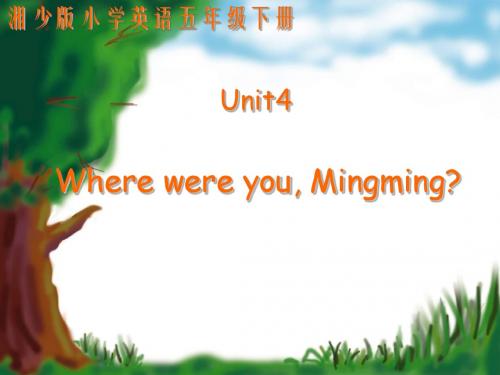
那么昨天你在哪里?
My uncle came from Beijing . We went to the railway station to meet him. 我叔叔从北京来。我们去火车站接他。
All right,Mingming. Finish your work and give it to me tomorrow.
weekdays
Monday Tuesday Wednesday Thursday Friday
weekdays
Saturday Sunday
weekends
yesterday
today
sick
railway station
Today is
Tuesday
Yesterday was Monday
5.不规则动词的过去式需特殊记忆。
Hale Waihona Puke am(is)-was 是 are-were 是 go-went 走 buy –bought 买 sell—sold 卖 come-came 来 take-took 拿 have (has)-had 有 begin -began开始 can—could 能 cut—cut 砍 do/does—did 做 draw--drew画画 eat--ate吃, fall--fell跌倒, feel--felt感觉, get--got获得, spend --spent花费 make--made做, read--read读, tell --told告诉, run--ran跑, say --said说, see –saw看 见
3. 情态动词的一般过去时态
肯定句式:主语 + 情态动词 + 其它 否定句式:主语 + 情态动词 + not + 其它. 一般疑问句:情态动词 + 主语 + 其它? 注:情态动词的过去式:can→could , may→might , must→must ,will-would, should-should。
湘少版英语三年级上册-Unit-4-How-old-are-you

2. You're six. 你今年六岁。 详解:本句用来描述对方的年龄,You're=You are,are 用于主语是you或者复数的后面。 句型结构:You're + 数字. 例句:You're ten.
3. He's two. 他今年两岁。 详解:本句是用来描述男性的年龄的句型,He's=he is, is用于主语是第三人称单数的后面。 句型结构:He's + 数字. 例句:He's ten. 拓展:描述女性的年龄,用she来代替he。
How old are you?
I’m eight.
Sit down, please.
Sentences
1. How old are you? 你几岁了? 详解: how old意为“多大;几岁”,用于询问年龄。 句型结构: How old are you?
Sentences
2. I'm eight. 我八岁。 详解:该句用来回答别人自己多少岁。 句型结构: I’m + 数字. 例句: —How old are you? —I’m nine.
How about you?
I don’t know.
D Let's Read
You’re six.
How old are you, Tim?
I’m eight.
D Let's Read
How old are you, Doggie?
Oh, yeah!
Woof, woof.
He’s two.
Sentences
1. I don’t know. 我不知道。 详解:know意为“知道”,don't表否定意义。当不知道 对方问题的答案时,可以说“I don’t know.”。 例句:—How old are you, Dino? —I don’t know.
湘少版四年级上册英语Unit 4
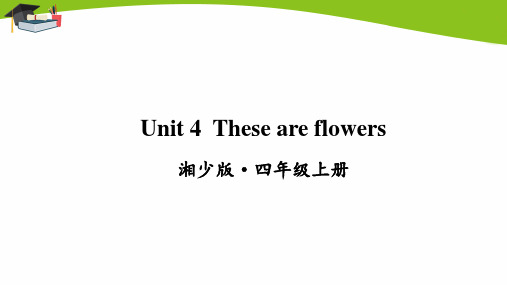
Play roles
__T_h_e_s_e_ are flowers.
__T_h_o_s_e_ are birds.
Let’s Learn
flowers
花
trees
树
grass
草
sheep
eggs
birds
绵羊
蛋
鸟
Let’s Act
What are those?
They are eggs. They are birds’ eggs.
Unit 4 These are flowers
湘少版·四年级上册
Lead-in
Do you know them?
New words
these
这些
flower
花
children
child的复数
those
那些
ቤተ መጻሕፍቲ ባይዱgg
蛋
tree
树
grass
草
sheep
绵羊
Let’s Listen and Say
3. Yes, they are birds’ eggs. 是的,它们是鸟蛋。
birds’ eggs意思是“鸟的蛋”,其中birds 后加’ 是名词的所有格形式,表示所属关系, 就是表示某物是属于某人或某物的。
构成规则:
(1)单数名词和不是以s结尾的复数名词,在词尾 加“’s”。例如: Mike’s book 迈克的书
The children are on an outing.
These are flowers.
Yes. They are beautiful!
What are those?
Those are eggs.
湘少版-英语-三下-Unit4_第3课时教学设计

Unit4 第3课时教学设计一、教学目标(一) 语言目标1. 语音:了解字母Hh在单词中的发音。
2. 词汇:巩固B部分单词,正确书写四会单词shirt和coat。
3. 句型:熟练运用句型“Look at ...”“It’s ...”谈论自己设计的服装。
(二) 应用目标1. 能认读有关服装的英文单词。
2. 能初步运用本单元单词和重点句型谈论服裝的颜色及大小。
二、教学重、难点1. 重点:认读服装单词,识记四会单词,吟唱歌谣。
2. 难点:学生在完成任务“创意无极限”时,有可能会碰到本单元没学过的服装单词,教师可用课件或小黑板给学生呈现一些常见的表示服装的单词。
三、教学准备单词卡片、自制单词视力测试表、纸帽子、音频(教师可在优教平台直接下载使用)(有条件的学校可利用幻灯片、多媒体课件)。
四、教学过程Step 1 热身/复习(Warm-up / Revision)1. Greetings.2. 展示学生迷你小书作业,作为课前阅读资源呈现。
3. 教师出示颜色和服装单词卡,学生快速认读后,教师将卡片打乱贴于黑板上,学生将单词按颜色和服裝归类。
Step 2 学中学(Let’s learn to learn)1. 学生自读E部分,找出服装单词coat,教师示范拼和板书在四线三格中。
2.教师出示自制单词视力测试表(仿照书中图片制作),指单词“coat”,间:“What can you see?”帮助学生说:“‘Coat’ I can see. ”教师指单词“ dress” 问:What can you see?”帮助学生回答:“‘Dress’ I can see.”3. 教师再指shirt一词如:T: What can you see?Ss: “Shirt”, I can see.T: Spell the word “s h irt” please.Ss: S-h-i-r-t. Shirt.Step 3 歌摇演练(Let’s chant)1. 教师出示一个盒子让学生猜:“Guess, what’s inside?”请学生运用句型“Is this your…?”询问。
三至六年级重点句型汇总(素材)湘少版小学英语

小学英语总复习资料三年级上册重点句型Unit 1Hi/Hello, I’m Mingming. 你好,我是明明。
Nice to meet you. 很高兴见到你。
Unit 2Good morning, Peter. 早上好,彼得。
Good afternoon, class. 下午好,同学们。
Who are you? 你是谁?Let me see. 让我想想。
Unit 3What’s your (English) name? 你的(英文)名字叫什么?My (English) name is Peter. 我(的英文名)叫彼得。
Stand up, please. 请站起来。
Sit down, please. 请坐下。
Read and say. 读一读,说一说。
Unit 4How old are you? 你多大了?I’m eight. 我八岁了。
I don’t know. 我不知道。
Read them after me. 跟着我读。
How about you? 你呢?Unit 5This is my father/mother. 这是我的爸爸/妈妈。
Unit 6Who’s he/she? 他/她是谁?He’s my grandfather. 他是我的爷爷。
She’s my grandmother. 她是我的奶奶。
Unit 7What’s it? 它是什么?It’s a cat. 它是一只猫。
Unit 8What’s this? 这是什么?It’s a pencil-box. 这是一个文具盒。
What’s that? 那是什么?How beautiful! 真漂亮啊!Unit 9What’s this? 这是什么?It’s a nose. 它是一个鼻子。
I’m sorry. I don’t know. 对不起。
我不知道。
Anne, do you know it? 安妮,你知道它(是什么)吗?Unit 10Touch your head. 摸摸你的头。
- 1、下载文档前请自行甄别文档内容的完整性,平台不提供额外的编辑、内容补充、找答案等附加服务。
- 2、"仅部分预览"的文档,不可在线预览部分如存在完整性等问题,可反馈申请退款(可完整预览的文档不适用该条件!)。
- 3、如文档侵犯您的权益,请联系客服反馈,我们会尽快为您处理(人工客服工作时间:9:00-18:30)。
Where
were you on Saturday? where在哪 are 过去式 were Saturday星期六 注意:在具体某一天用on, 如:on Saturday在星 期六, on Monday在星期一 星期六你去哪里了? I was sick. I was in bed at home. am 过去式 was sick [sɪk] 病的 in bed在床上 at home在家 我生病了,我在家里躺着。
1、where
was Tim on Friday? Tim was on Friday. 2、where was Tim on Saturday? Tim was . 3、where was Tim on Thursday? He was . 4、How did Tim feel when he was looking at the Baofeng Lake? He felt . 5、Where was Tim on Monday? He was .
5、
今天是星期一,明明没有交作业。 Mingming,
why didn’t you hand in your work? why为什么 hand in交(上来) do not=don’t 不 do 过去式 did did not= didn’t don’t 过去式 didn’t 明明,你为什么没有交作业呢? Sorry, Miss Pan. I was busy. am 过去式 was busy [‘bɪzɪ]忙碌的 对不起,潘老师,我太忙了。
我叔叔从北京回来了,我们去火车站接他。
All
right, Mingming. Finish your work and give it to me tomorrow. all right 好吧,好的 finish [‘fɪnɪʃ] 完成,结束 give [gɪv] 给 tomorrow [tə‘mɒrəʊ] 明天 好吧,明明。把作业做完,明天交给我。
He was at the Jiutian Caves on Friday, and saw a very pretty cave there. cave [keɪv] 洞穴,窑洞 Friday星期五 see 过去式 saw [sɔː] 看见 pretty 可爱的,漂亮的 在星期五,他去了九天洞。在那看见了一个非 常漂亮的岩洞。 He spent Saturday around Mount Tianzi and he saw a big waterfall there, too. spend [spend]过去式 spent 度过,花费; Saturday ['sætədɪ; -de]星期六 around [ə‘raʊnd]在附近 ,在…周围
1、Where
was Tim on Friday? Tim was on Friday. 2、Where was Tim on Saturday? Tim was . 3、Where was Tim on Thuen he was looking at the Baofeng Lake? He felt . 5、Where was Tim on Monday? He was .
Example
Part D Let’s read and write 读一读,写一写
Last
week, Tim went to visit his cousins. His cousins live in Zhangjiajie. He went to many places there. On Wednesday, he went to visit the Suoxi Valley. He was at Baofeng Lake on Thursday. He felt happy. He was at the Jiutian Caves on Friday, and saw a very pretty cave there. He spent Saturday around Mount Tianzi and he saw a big waterfall there, too. Tim was very tired when he went home on Monday.
Where
were you yesterday, then? yesterday [‘jestədeɪ】 昨天 then [ðen] 当时,那么 那么,昨天你又去哪里了? My uncle came from Beijing. We went to the railway station to meet him. uncle [‘ʌŋk(ə)l] n. 叔叔;伯父;伯伯 come来 过去式 came from从 go去 过去式 went railway station 火车站 meet 遇见,相遇
Part D Let’s read and write 读一读,写一写
Last
week, Tim went to visit his cousins. last [lɑːst] 上个,最近,最后, last week 上个星期 go去 过去式 went visit 参观,拜访 cousin [‘kʌz(ə)n] (单数)----cousins(复数) 堂兄弟姊妹;表兄弟姊妹 上个星期,蒂姆去看他的堂兄。
On
Wednesday, he went to visit the Suoxi Valley. valley ['væ lɪ] 峡谷 星期三,他去了索溪谷。 He was at Baofeng Lake on Thursday. am 过去式 was at 在 lake [leɪk] 湖 星期四,他去了宝峰湖。 He felt happy. feel 过去式 felt 感觉 他很开心。
His
cousins live in Zhangjiajie. he他----his他的 she她-----her她的 live in居住在 他的堂兄住在张家界。 He went to many places there. place [pleɪs] -------places 地方 there 那里 在那,他游览了很多地方。
昨天 2、today [tə'deɪ] 今天 3、 weekdays [‘wiːkdeɪz] 工作日 4、 sick [sɪk] 生病的 、病人
railway station ['reɪlweɪ] ['steɪʃ(ə)n] 火车站 Part A: 听一听,说一说 Where were you, Mingming? 1、are 过去式 were 你去哪了,明明? Today is Monday and Mingming does not hand in his work. today今天 Monday星期一 hand in交(上来) do 第三人称单数 does work作业
Unit4 Where were you, Mingming?
本单元目标: 掌握词汇:yesterday, today, weekdays, sick, railway station. 重点语法:1、掌握一般过去时的用法 2、动词过去式的变化规则
Part B: 学一学 1、 yesterday ['jestədeɪ]
Part C Let’s practice练一练
问你的五个朋友,看他们周末在干什么。像这样在 表格里写出来。 小陈 琳达 简 雯雯 大卫
动物园
星期六 图书馆 祖父母 家 星期天
例如: A : Where were you on Saturday,Xiao Chen? A :星期六你去哪里了,小陈? B :I was at the library. B : 我在图书馆。
mount [maʊnt] 山 waterfall ['wɔːtəfɔːl] 瀑布 他在天子山度过了星期六,在那儿看到了一个很 大的瀑布。 Tim was very tired when he went home on Monday. tired [taɪəd] 疲倦的;厌倦的, Monday [‘mʌndeɪ] 星期一 蒂姆在星期一回到家时感到非常累。
